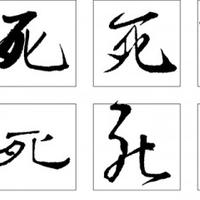#7: “死 ”的 用法
||usage
morte||
#Nr. 7: Verwendung von "tot"
#7: Usage of "dead"
#7: Uso de "muerto
#7: Uso di "morto"
#7位:"dead "の用法
#7: Использование слова "мертвый"
在 中文 里面 ,“ 死 ” 除了 表示 死亡 、 去世 的 意思 之外 , 还有 一个 重要 的 用法 。
|||||indicates|death|passed away|||besides|||||
||||além de|indicar|morte|falecer|||além de|||||
In Chinese, “death” has an important usage in addition to the meaning of death and death.
这种 用法 在 口语 中 使用 , 能 很 夸张 地 描述 一件 事情 或者 表达 人 的 心情 。
this kind of|||spoken language|||||exaggerated||||||express|||mood
|||oral||uso|||exagerado||descrever|||||||humor
Diese Verwendung wird im Umgangssprache verwendet, um eine Sache sehr stark zu beschreiben oder die Gefühle einer Person auszudrücken.
This usage is used in spoken language and can be an exaggerated description of a thing or a person's mood.
Kata ini digunakan dalam bahasa lisan untuk menggambarkan suatu peristiwa atau mengekspresikan suasana hati seseorang dengan cara yang sangat berlebihan.
这种 用法 很 简单 , 就是 “ 动词 / 形容词 + 死 了 ”。
|||||died|adjective||
|||simples||verbo|adjetivo||
Diese Verwendung ist sehr einfach, es ist einfach "Verb / Adjektiv + tot".
This usage is very simple, that is, "verb / adjective + dead."
如果 天气 很 热 , 人们 抱怨 “ 热死 了 ”。
|||||complain|so hot|
|||||reclamam|morrendo de calor|
Wenn das Wetter heiß ist, beschweren sich die Leute: "Ich sterbe vor Hitze".
If the weather is hot, people complain that “hot is dead”.
公共汽车 上人 太 多 , 人们 抱怨 “ 挤死 了 ”。
|boarding|||||suffocated|
ônibus|subir pessoas|||||sufocar|
遇到 不 高兴 的 事情 , 人们 就 抱怨 “ 气死 了 ”。
||||||||angry|
||||||||morrendo de raiva|
Wenn Menschen auf etwas Unangenehmes stoßen, beschweren sie sich und sagen: "Es macht mich echt sauer."
When people encounter unhappy things, people complain that they are "mad."
突然 被 惊吓 , 人们 就 抱怨 “ 吓死 了 ”。
||scared||||scared to death|
||susto||||morrendo de medo|
Wenn Menschen plötzlich erschreckt werden, beschweren sie sich und sagen: "Ich habe mich total erschrocken."
Suddenly frightened, people complained that they were "scared to death."
工作 太 多 , 工人 抱怨 “ 累死 了 ”。
|||||exhausted|
|||trabalhador||cansado|
Wenn die Arbeit zu viel wird, klagen die Arbeiter und sagen: "Ich bin total erschöpft."
There is too much work, and the workers complain that they are "tired."
没有 事情 做 , 人们 抱怨 “ 无聊 死 了 ”。
|||||bored||
|||||chato||
如果 肚子 很 饿 , 可以 说 “ 饿死 了 ”; 但是 别 吃 太 多 , 否则 就要 “ 撑死 了 ”。
||||||starving|||||||otherwise||overeat|
|barriga|||||morrer de fome|||||||senão||explodir de comer|
If your stomach is very hungry, you can say "starve to death"; but don't eat too much, otherwise you will "support death."
另外 , 还有 “ 担心 死 了 ”,“ 着 急死了 ” 等等 。
In addition||||||worried to death|
além disso||preocupar|||partícula de ação|morrendo de ansiedade|etc.
Außerdem gibt es Ausdrücke wie "so besorgt, dass man sterben könnte" und "so gestresst, dass man sterben könnte".
In addition, there are also "worried about death", "anxiously dead" and so on.
如果 你 的 中文 很 好 , 你 甚至 可以 说 慢速 中文 “ 慢死 了 ”。
|||||||even|||slow||slow death|
|||||||até|||devagar||lento|
Wenn Sie sehr gut Chinesisch können, könnten Sie sogar langsam chinesisch sprechen und sagen "so langsam, dass man sterben könnte".
If your Chinese is very good, you can even say that slow Chinese "slowly dead".
Jika bahasa Mandarin Anda sangat bagus, Anda bahkan dapat mengatakan bahwa bahasa Mandarin yang lambat adalah "lambat sampai mati".
更 有意思 的 是 ,“ 死 ” 也 可以 用来 表达 好 心情 。
|||||||usar|||
Noch interessanter ist, dass "sterben" auch verwendet werden kann, um gute Stimmung auszudrücken.
More interestingly, "death" can also be used to express a good mood.
收到 礼物 , 寿星 觉得 “ 开心 死 了 ”。
received||Birthday Star||||
receber||aniversariante||||
After receiving the gift, Shouxing felt "happy and dead".
考试 取得 好 成绩 , 学生 觉得 “ 高兴 死 了 ”。
|achieved|||||||
|obter||nota|||||
Beim Erzielen guter Ergebnisse in Prüfungen fühlen sich die Schüler 'glücklich bis zum Tod'.
The test scored good and the students felt "happy to die."
见到 明星 , 歌迷 们 觉得 “ 激动 死 了 ”。
|star||||||
ver|estrela|fãs de música|||excitado||
Wenn Fans ihre Lieblingsstars sehen, fühlen sie sich 'aufgeregt bis zum Tod'.
When I saw the stars, the fans felt that "excited to die."
另外 , 还有 “ 兴奋 死 了 ”,“ 幸福 死 了 ” 等等 。
||excited||||||
|||||feliz|||
Darüber hinaus gibt es auch 'aufgeregt bis zum Tod', 'glücklich bis zum Tod' und so weiter.
In addition, there are “excited death”, “happiness is dead” and so on.
记住 , 在 这种 好 的 情况 下 , 一般 不用 这种 用法 来 描述 一件 事情 。
lembrar|||||||geralmente|||||descrever||coisa
Denken Sie daran, dass in einer so guten Situation im Allgemeinen keine Verwendung dieses Ausdrucks zur Beschreibung einer Sache besteht.
Remember, in this good case, this usage is generally not used to describe one thing.

